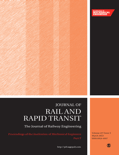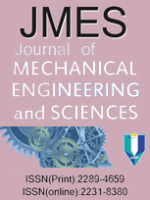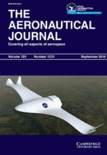
International Journal of Heavy Vehicle Systems
Scope & Guideline
Driving Innovation in Heavy Vehicle Systems
Introduction
Aims and Scopes
- Vehicle Dynamics and Control:
Research on the dynamics of heavy vehicles, including stability, control systems, and ride comfort, is a core focus. This includes studies on lateral stability, braking systems, and the influence of vehicle parameters on performance. - Energy Efficiency and Alternative Fuels:
Exploration of energy management strategies, hybrid systems, and alternative fuel technologies for heavy vehicles. This includes investigations into fuel consumption, emissions reduction, and the integration of electric and hybrid drive systems. - Intelligent Transport Systems (ITS):
The journal emphasizes the development of intelligent transport systems that enhance traffic management, vehicle-to-everything (V2X) communication, and autonomous vehicle technology. - Material and Structural Analysis:
Research on materials used in heavy vehicles, including fatigue analysis, vibration suppression, and structural optimization. This area aims to improve durability and performance through advanced material science. - Simulation and Modelling Techniques:
The use of simulation and modeling to predict vehicle performance under various conditions is a significant methodological approach in the journal. This includes dynamic modeling, computational fluid dynamics (CFD), and finite element analysis (FEA).
Trending and Emerging
- Autonomous and Connected Vehicle Technologies:
There is a growing emphasis on research related to autonomous vehicles and their integration into existing traffic systems. This includes studies on vehicle-to-vehicle (V2V) and vehicle-to-infrastructure (V2I) communication. - Sustainability and Green Technologies:
An increasing number of papers focus on sustainability, including the use of alternative energy sources, energy-efficient designs, and the life cycle analysis of heavy vehicles. This trend reflects a global shift towards reducing the environmental impact of transportation. - Advanced Control Systems and AI Integration:
The integration of artificial intelligence and advanced control systems for improving vehicle performance and safety is becoming a prominent theme. This includes machine learning applications for predictive maintenance and optimization of vehicle dynamics. - Smart Infrastructure and Traffic Management Solutions:
Research is trending towards developing smart infrastructure solutions that enhance the efficiency of heavy vehicle operations, including intelligent traffic light systems and urban planning for heavy vehicle routes. - Robotics and Automation in Heavy Vehicle Systems:
The use of robotics and automated systems for monitoring, maintenance, and operation of heavy vehicles is on the rise. This includes autonomous monitoring systems for construction vehicles and robotic interventions in logistics.
Declining or Waning
- Traditional Mechanical Systems:
Research focused on conventional mechanical systems without integration of modern technologies (e.g., basic hydraulic systems) has seen a decrease, as the field moves towards more integrated and intelligent solutions. - Basic Diesel Engine Studies:
With the increasing focus on alternative fuels and electric vehicles, traditional studies on diesel engine performance without consideration of hybridization or emissions control have diminished. - Static Safety Analysis:
Static analyses of vehicle components, which do not incorporate dynamic factors or real-world conditions, appear to be waning in favor of more holistic approaches that consider dynamic interactions and performance under various operational scenarios.
Similar Journals

Frontiers in Mechanical Engineering-Switzerland
Unleashing Potential Through Open Access ResearchFrontiers in Mechanical Engineering-Switzerland, published by FRONTIERS MEDIA SA, is a pioneering open-access journal that has been fostering innovations in the field of mechanical engineering since its inception in 2015. Based in Switzerland, this journal provides a robust platform for disseminating cutting-edge research across multiple disciplines within mechanical engineering, including materials science, industrial and manufacturing engineering, and computer science applications. With impressive Scopus rankings, including Q2 statuses in key categories such as Industrial and Manufacturing Engineering and Mechanical Engineering, it stands out as a valuable resource for researchers and practitioners aiming to stay abreast of trends and breakthroughs in these fields. By embracing open-access principles, the journal ensures that high-quality research is readily available to a global audience, thereby promoting collaboration and knowledge sharing. As it continues to grow, Frontiers in Mechanical Engineering is poised to make significant contributions to both academic and professional communities, enhancing understanding and advancing practices in engineering disciplines.

PROCEEDINGS OF THE INSTITUTION OF MECHANICAL ENGINEERS PART F-JOURNAL OF RAIL AND RAPID TRANSIT
Transforming Transit: The Journal of Mechanical Engineering ExcellencePROCEEDINGS OF THE INSTITUTION OF MECHANICAL ENGINEERS PART F - JOURNAL OF RAIL AND RAPID TRANSIT is a premier academic journal published by SAGE Publications Ltd, focusing on the latest advancements in rail transportation and rapid transit systems. With an ISSN of 0954-4097 and E-ISSN of 2041-3017, this journal has garnered significant attention in the field, achieving a Q2 category ranking in Mechanical Engineering and securing a Scopus rank of #192 out of 672, placing it in the 71st percentile. Covering converged years from 1989 to 2024, it provides a platform for innovative research and discussions that address the complexities and evolving technologies within the rail industry. Its publication draws contributions from esteemed researchers, professionals, and students alike, fostering a crucial dialogue on sustainability, efficiency, and advancements in transit infrastructure. While the journal is not open access, it remains a vital resource for those committed to pushing the boundaries of mechanical engineering and rail systems development.

eTransportation
Advancing Knowledge in Automotive and Energy EngineeringeTransportation is a premier academic journal published by Elsevier, dedicated to advancing the fields of Automotive Engineering, Electrical and Electronic Engineering, Energy Engineering and Power Technology, and Transportation. Since its inception in 2019, the journal has achieved an outstanding reputation, maintaining a prestigious Q1 ranking across multiple categories in the 2023 Scopus rankings, including a remarkable top position in Automotive Engineering. With an impact factor reflecting its influence and rigorous peer-review process, eTransportation serves as a vital platform for researchers, professionals, and students alike, fostering innovation and disseminating vital research findings that shape the future of transportation technologies. Based in the Netherlands, it supports open access options that enhance the visibility and accessibility of research, ensuring scholarly engagement worldwide. As the field evolves, eTransportation is poised to lead discussions and advancements towards more efficient, sustainable, and intelligent transport solutions.

Journal of Mechanical Engineering and Sciences
Connecting Global Minds in Mechanical Engineering ResearchThe Journal of Mechanical Engineering and Sciences (ISSN: 2289-4659, E-ISSN: 2231-8380), published by UNIV MALAYSIA PAHANG, is a prominent open access journal established in 2011, dedicated to advancing the field of mechanical engineering and associated sciences. Covering a wide array of topics from industrial manufacturing processes to computational mechanics, the journal serves as a vital platform for researchers, professionals, and students to disseminate innovative findings and methodologies. With impressive Scopus rankings, including a place in the 60th percentile for Industrial and Manufacturing Engineering, the journal holds a significant position among its peers, facilitating global academic discourse. Located in Kuantan, Pahang, Malaysia, the journal emphasizes accessibility and collaboration within the engineering community, encouraging submissions that contribute to both theoretical and applied aspects of mechanical engineering.

INTERNATIONAL JOURNAL OF AUTOMOTIVE TECHNOLOGY
Accelerating Knowledge in Automotive TechnologyINTERNATIONAL JOURNAL OF AUTOMOTIVE TECHNOLOGY, published by the Korean Society of Automotive Engineers (KSAE), stands as a key platform in the field of Automotive Engineering since its inception in 2000. With an ISSN of 1229-9138 and an E-ISSN of 1976-3832, this esteemed journal aims to disseminate cutting-edge research, innovative methodologies, and advancements in automotive technology. As of 2023, it holds a distinguished Q2 quartile ranking in the Automotive Engineering category on Scopus, featuring a competitive rank of 48/125, illustrating its recognition among peers and the academic community. The journal also enjoys a global readership despite its base in South Korea. Researchers, professionals, and students in the automotive sector are encouraged to contribute to this journal, thus promoting collaboration and knowledge exchange that fosters innovation and progress in automotive engineering. Additionally, the journal is committed to enhancing accessibility of knowledge across boundaries and aims to continue serving as a catalyst for academic growth up to the year 2024.

International Journal of Intelligent Transportation Systems Research
Bridging Academia and Industry in Transportation SystemsInternational Journal of Intelligent Transportation Systems Research, published by Springer, stands as a premier platform for disseminating cutting-edge research in intelligent transportation systems (ITS). Established in 2010, this journal has made significant strides in addressing the complexities and innovations within the realm of transportation engineering, automotive technology, control systems, and information systems, reflected in its impressive categorization across diverse engineering and applied mathematics disciplines with notable rankings in Q2 and Q3 quartiles. With a steadfast commitment to advancing knowledge and fostering discussions that bridge academia and industry, the journal welcomes high-quality research articles, reviews, and case studies that explore emerging trends, technologies, and methodologies shaping the transport sector. Researchers, professionals, and students alike will find a wealth of insights aimed at optimizing operational efficiencies and enhancing safety and sustainability in transportation networks. As of 2023, the journal continues to thrive, seeking to compile contributions that align with its mission of improving transportation systems globally.

SAE International Journal of Passenger Vehicle Systems
Transforming Ideas into Automotive SolutionsWelcome to the SAE International Journal of Passenger Vehicle Systems, a premier publication in the realm of automotive engineering. Published by SAE International, this journal serves as a critical platform for disseminating high-caliber research focused on the innovation and advancement of passenger vehicle systems. With an impact factor that reflects its growing influence, this open-access journal enhances visibility and accessibility, supporting a diverse readership that includes researchers, engineers, and automotive professionals. Covering a broad scope that incorporates safety, reliability, and mechanical engineering among others, the journal is categorized in the Q3 and Q4 quartiles for various engineering fields, indicating its significance and the potential for impactful contributions to ongoing discussions within the automotive sector. The Scopus rankings further underscore its commitment to quality, placing it within the mid-range of prominent publications. As a valued resource, the SAE International Journal of Passenger Vehicle Systems from 2022 to 2024 offers a vital forum for knowledge exchange, aimed at inspiring breakthroughs in automotive technology and enhancing passenger safety.

IEEE Intelligent Transportation Systems Magazine
Driving the Future of Intelligent MobilityIEEE Intelligent Transportation Systems Magazine, published by the IEEE-Institute of Electrical and Electronics Engineers Inc., is a leading journal in the fields of automotive engineering, computer science applications, and mechanical engineering. With an impressive impact factor reflected in its 2023 rankings, this journal sits in the top quartile (Q1) across multiple engineering categories, making it an essential resource for researchers and professionals dedicated to advancing the intelligent transportation systems landscape. The magazine covers a diverse array of topics from vehicle technology innovations to traffic management solutions, aimed at improving transportation efficiency, safety, and sustainability. Since its inception in 2009, the publication has established a solid reputation for disseminating cutting-edge research and practical applications in intelligent transportation, all while remaining an accessible resource for academic and industrial stakeholders alike. Subscribe today to stay at the forefront of transformative transportation technologies!

Journal of Unmanned Vehicle Systems
Pioneering advancements in control systems and aerospace engineering.Journal of Unmanned Vehicle Systems, published by CANADIAN SCIENCE PUBLISHING, is a leading peer-reviewed journal dedicated to advancing the field of unmanned vehicle technology. With an ISSN of 2291-3467, this journal provides an essential platform for researchers and professionals interested in the intersection of engineering, computer science, and control systems as they pertain to unmanned vehicles. The journal has achieved commendable rankings in Scopus, including a rank of #17/118 in Mathematics - Control and Optimization and #23/131 in Aerospace Engineering, reflecting its impact in these significant areas. As an open-access journal, it fosters global collaboration and accessibility, ensuring that innovative research in unmanned vehicle systems reaches a broad audience. The journal's objectives are to publish high-quality research articles, technical notes, and reviews that contribute to the understanding and development of autonomous systems. With its coverage spanning from 2013 to 2021, the Journal of Unmanned Vehicle Systems remains a vital resource for advancing discussions and knowledge in this rapidly evolving field.

AERONAUTICAL JOURNAL
Innovating the future of aeronautical research.Aeronautical Journal, published by Cambridge University Press, is a premier scholarly journal dedicated to advancing the field of aerospace engineering. With a notable impact factor, this journal holds a strong position in the academic community, ranked #53 out of 153 in the Scopus category of Aerospace Engineering, placing it in the 65th percentile. The journal has been providing a platform for groundbreaking research since its inception in 1969, and continues to be a vital resource for researchers, professionals, and students involved in aeronautics. As a Q2 journal in the 2023 Aerospace Engineering category, it offers high-quality articles that cover a range of topics within the discipline, contributing to the ongoing discourse and innovation in aerospace technologies. Although not an open-access journal, it remains accessible to a vast readership through institutional subscriptions and partnerships. The Aeronautical Journal is a crucial publication for those seeking to stay at the forefront of aerospace research and development.